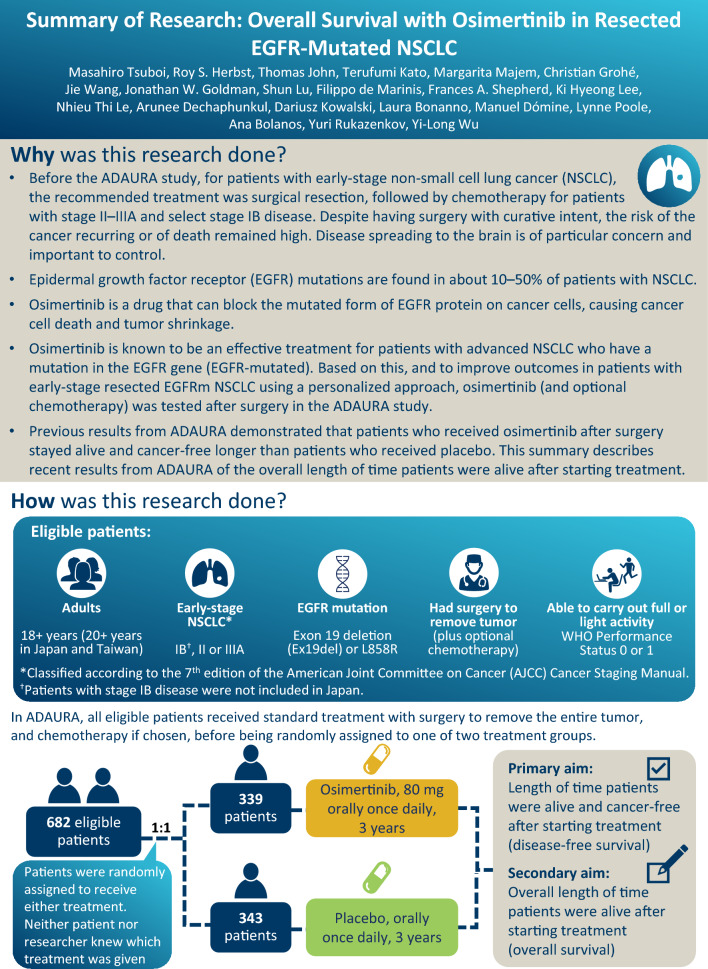Abstract
This is a summary of the original article ‟Overall survival with osimertinib in resected EGFR-mutated NSCLC.ˮ Osimertinib blocks the activity of the epidermal growth factor receptor (EGFR) on cancer cells, causing cancer cell death and tumor shrinkage, and is an effective treatment for EGFR-mutated non-small cell lung cancer (NSCLC). The ADAURA study assessed the effects of osimertinib versus placebo in patients with EGFR-mutated (exon 19 deletion or L858R) early stage (IB–IIIA) NSCLC removed by surgery (resected). Previous results from ADAURA demonstrated that patients treated with osimertinib stayed alive and cancer-free (disease-free survival) significantly longer than patients who received placebo. Recent data showed the overall length of time patients were alive after starting treatment (overall survival). In both the primary stage II–IIIA and overall stage IB–IIIA populations, patients in the osimertinib group had a significant 51% reduction in the risk of death compared with the placebo group. The data demonstrated that osimertinib after surgery significantly improved overall survival in patients with resected, EGFR-mutated, stage IB–IIIA NSCLC.
Summary of Research
This is a summary of the original article: ‟Overall survival with osimertinib in resected EGFR-mutated NSCLCˮ [1]. We present the results from the ADAURA trial on the overall length of time patients were alive after starting treatment (Fig. 1).
Fig. 1.
.
Acknowledgments
The authors thank Laura Floyd and Shannon Gall for reviewing and providing valuable contributions to the development of this summary.
Declarations
Funding
Funded by AstraZeneca; ADAURA ClinicalTrials.gov number, NCT02511106. Medical writing assistance was provided by Sally Cotterill, Ph.D., CMPP, of Ashfield MedComms, an Inizio Company, and was funded by AstraZeneca in accordance with Good Publications Practice (GPP) guidelines (https://www.ismpp.org/gpp-2022).
Disclosures
Please see the original article for full author disclosures. In addition to these disclosures, Masahiro Tsuboi reports invited speaker/honoraria roles: Daiichi Sankyo. Thomas John reports consulting/advisory roles: Gilead Sciences, Johnson & Johnson, Seagen, Specialised Therapeutics, and Takeda. Margarita Majem reports a consulting/advisory role with Cassen Recordatti; invitation to a speaker/speakers’ bureau from Amgen, AstraZeneca, Helssin, Merck Sharp & Dohme, Roche, and Sanofi; meeting/travel support from AstraZeneca, Merck Sharp & Dohme, and Roche; and research support from Bristol Myers Squibb. Filippo de Marinis reports a consulting/advisory role: AstraZeneca. Laura Bonanno reports consulting/advisory roles with AstraZeneca, Bristol Myers Squibb/Medarex, MSD Oncology, Novartis, and Roche/Genentech and speakers’ bureau participation with Novartis/Ipsen, AstraZeneca/MedImmune, Bristol Myers Squibb/Medarex, and Novartis/Ipsen. Manuel Dómine reports consulting/advisory roles: AstraZeneca, MSD Oncology, Pfizer, Roche, and Takeda.
Compliance and Ethics Guidelines
The trial was conducted in accordance with the provisions of the Declaration of Helsinki, the Good Clinical Practice guidelines of the International Council for Harmonization, applicable regulatory requirements, and the bioethics and human samples policy of the sponsor. The protocol was approved by relevant institutional review boards or ethics committees. All patients provided written informed consent. This article is based on a previously conducted study and does not contain any new data from studies with human participants or animals performed by any of the authors.
Consent for Publication
Not applicable.
Data Availability
Provision of standard data underlying the findings described in this manuscript may be obtained in accordance with AstraZeneca’s data sharing policy described at https://astrazenecagrouptrials.pharmacm.com/ST/Submission/Disclosure.
Code Availability
Not applicable.
Author Contributions
All authors contributed to the development of this article and approved the final document.
Reference
- 1.Tsuboi M, Herbst RS, John T, et al. N Engl J Med. 2023;389:137–147. doi: 10.1056/NEJMoa2304594. [DOI] [PubMed] [Google Scholar]
Associated Data
This section collects any data citations, data availability statements, or supplementary materials included in this article.
Data Availability Statement
Provision of standard data underlying the findings described in this manuscript may be obtained in accordance with AstraZeneca’s data sharing policy described at https://astrazenecagrouptrials.pharmacm.com/ST/Submission/Disclosure.




